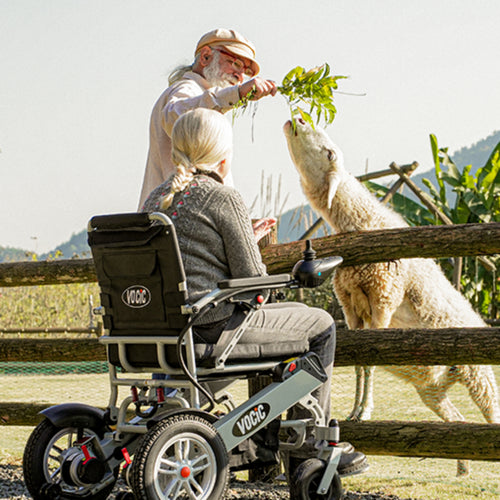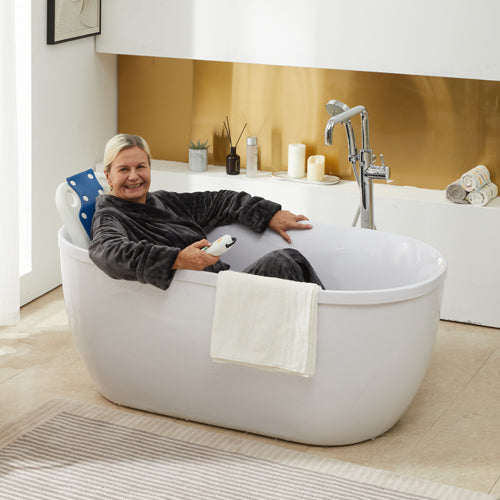Whether or not one should purchase a rollator walker needs to be determined by one's physical requirements, and not all post-operative recoveries require the purchase of a walker.
This article is only to help you to determine whether you need a walker or not. You need to consult your doctor or physiotherapist for details.
Who Should Use a Rollator?
People who need to buy a walker have some walking impairment, those who cannot walk at all, or those who have minor leg injuries do not need to buy it. I have listed some of the user groups that use rollator walkers as follows:
- Seniors with mobility issues: As they age, many seniors may experience weakened muscles, arthritis pain, or decreased balance, and the use of a walker can help them maintain their ability to move independently.
- Patients in rehabilitation: For those who have undergone surgery or injuries (e.g., hip replacement, knee surgery, etc.), a walker may be needed to assist with walking during the rehabilitation process, reducing the burden on the joints and speeding up recovery.
- People with walking difficulties: Some people who have difficulty walking due to illness or disability, such as those suffering from multiple sclerosis, Parkinson's disease, cerebral palsy, etc., may need a walker to provide additional support and stability.
- People with unsteady walking: This includes those with balance problems, which may be caused by neurological disorders, inner ear problems, or other health issues.
If you have any of these conditions narrated above, then consider buying a walker. Walkers come in many forms, including quadrupeds, rolled walker
standard walkers, etc.
Choosing the right model can effectively enhance the user's mobility and quality of life. Again, before purchasing a walker, you need to consult your doctor or contact us to get help.

In Which Case, I Should Not Buy a Walker but a Wheelchair
Selecting either a walker or a wheelchair largely hinges on your mobility, stamina, and daily needs. Here are instances where opting for a wheelchair might be preferable:
- Severe Mobility Impairment: If you are unable to stand or walk on your own, or if you lack the lower body strength to use a walker safely, a wheelchair is likely the better option.
- Significant Fatigue or Lack of Endurance: If walking even short distances causes excessive fatigue or if you have medical conditions that limit your stamina, a wheelchair can help you conserve energy and maintain a more active lifestyle.
- Lack of Balance and Stability: For individuals with severe balance disorders or those who are at high risk of falling, a wheelchair provides a stable form of mobility that significantly reduces the risk of injuries from falls.
- Medical Recommendations: In cases of progressive neurological diseases (such as advanced multiple sclerosis or ALS), or after certain types of surgery where weight-bearing is strictly limited, healthcare providers might recommend a wheelchair.
- Recovery from Major Surgery or Injury: If you are recovering from major surgery or a significant injury and are unable to walk for extended periods, a wheelchair can be essential for mobility and daily activities.
- Quality of Life and Independence: If using a walker is not enough to allow you to perform daily activities independently or if it doesn't provide sufficient mobility in your environment, a wheelchair might be necessary to enhance your quality of life and autonomy.
If you have any of these conditions, consider using a wheelchair. Normally, though, if you go to the doctor with these problems, the doctor will tell you which type of walking is better for your current situation.
In Which Case, I Should Not Buy a Walker but a Walking Stick
Choosing whether to use a walker or a walking stick usually depends on your mobility, stability needs, and safety concerns. Here are some situations where you may be better off with a cane than a walker:
- Minor Balance Issues: If you have only minor balance problems and don't require the extensive support of a walker, a walking stick can provide enough support to help maintain balance.
- Need for Light Support: For those who need only slight support, a walking stick offers sufficient assistance and is more portable and flexible compared to a walker.
- Partial Weight Bearing: If you can walk independently but need to alleviate pressure on one side of the body, a cane can help distribute weight and reduce stress on a painful or healing limb.
- Good Upper Body Strength and Coordination: Using a cane requires some arm strength and coordination. If your upper body strength and coordination are good, a cane can be an effective tool.
- Activities in Small Areas: If your activities are mainly within the home or other confined spaces where the ground is flat, a walking stick can sufficiently meet your daily needs.
- Suitability for Short Distances or Indoor Spaces: Canes are especially useful in indoor settings or situations where you need to maneuver in crowded places, such as offices or shopping malls.
If you're unsure about whether to use a cane, a walker, or another type of mobility aid, it's best to consult with a healthcare provider or physical therapist. They can assess your walking ability, physical strength, and overall health condition to recommend the most suitable mobility aid. Additionally, professional guidance can help you learn how to use a walking stick correctly to ensure safety and improve walking efficiency.
Tips for Buying a Perfect Rollator Walker
- Assess Mobility Needs: Consult your doctor to determine if you need a booster and what type of booster you need.
- Consider Walker Type:
A. Standard Walker: No wheels, offers maximum stability, good for indoor use where you can lift it as you walk.
B. Two-Wheeled Walker: Wheels on the front legs, easier to maneuver, require less lifting, suitable for slight to moderate support needs.
C. Four-Wheeled Walker (Rollator): Wheels on all four legs, including brakes, a seat, and often a basket. Best for outdoor use and for those who can walk longer distances but need a place to rest occasionally.
- Check the Weight and Height Adjustability: It should be light enough to lift and maneuver without straining, and adjustable in height to match your exact measurements for ergonomic use.
- Examine the Grips: After purchasing a walker, try the handles yourself for comfort. Purchase a grip that is soft, non-slip, and shaped to fit your hand to prevent fatigue and discomfort.
- Test for Stability: Try to take a few steps with the booster to make sure the booster is not wobbling to ensure safety.
- Portability and Storage: If you need to go on a long voyage, you can purchase a folding model of the booster cart from our website, which can be conveniently carried in both cars and airplanes.
- Accessory Options: Check if the walker can be customized with accessories such as trays, baskets, or pouches, which can be very handy for carrying personal items or shopping.
- Try Before You Buy: If possible, try out several different models to see which one feels most comfortable and suits your walking style.
- Budget: Finally, consider your budget. Our walkers range from $100-$400 which is definitely within your budget!
Choosing the right walker can significantly improve your mobility and quality of life, so taking the time to consider these factors carefully is important.

FAQ
1. Why do elderly people refuse to use a walker?
Elderly individuals often resist using walkers due to emotional and psychological reasons such as pride and the stigma associated with aging and disability. They might see using a walker as an admission of weakness or fear it will alter others' perceptions of them. Cosmetic concerns about the appearance of walkers, which can seem unattractive and clinical, also play a role.
Practical challenges like the complexity of use, especially in cramped living spaces, and the physical effort required can deter usage. Moreover, a lack of awareness about the benefits of walkers, fear of increased dependency, and financial concerns contribute to their reluctance.
But buying a walker is good for them, and we can help them to overcome these difficulties.
2. Can a rollator walker be used as a wheelchair?
No, despite rollator walkers having a seat, rollators are not suitable for use as wheelchairs. They lack features like footrests and are not designed for safe or comfortable extended seated mobility or for being pushed by another person over long periods.
They are meant for support while walking, not to substitute the full functionality of a wheelchair, which is designed for greater comfort, safety, and maneuverability when seated.
3. Is using a walker considered disabled?
Using a walker does not necessarily mean a person is disabled; it simply indicates that they need some assistance with mobility.
Many people use walkers due to temporary conditions (like recovery from surgery), age-related decline in mobility, or specific physical conditions.
The term "disabled" is broader and encompasses a range of physical, sensory, intellectual, or mental health conditions that substantially limit one or more major life activities.
Thus, using a walker might be part of how an individual manages their particular circumstances, whether they classify themselves as disabled or not.
Related Reading: What Is a Rollator Walker: A Guide for 2024?







